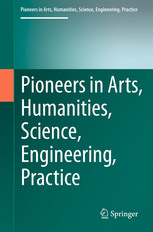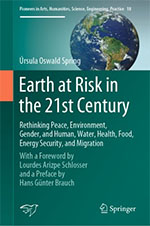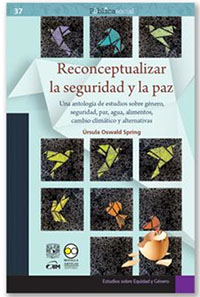|
|
| |
|
| |

Pioneers in
Arts, Humanities, Science, Engineering, Practice (PAHSEP)

Edited by
Hans Günter Brauch,
AFES-PRESS, chairman
Free University of Berlin (Ret.)

|
Úrsula Oswald Spring: Earth at Risk in the 21st Century: Rethinking Peace, Environment, Gender, and Human, Water, Health, Food, Energy Security, and Migration. Pioneers in Arts, Humanities, Science, Engineering, Practice (PAHSEP), No. 18 (Cham: Springer International Publishing, 2018).
ISBN (Hardcover): 978-3-030-38568-2
ISBN (Softcover): 978-3-030-38571-2
ISBN (MyCopy): 978-3-030-38570-5
Order this book on Springer Website |
- Special analysis of risks to the survival of humankind in the 21st century
- Interdisciplinary studies on peace, security, gender and environment related to global environmental and climate change
- Critical reflections on gender relations, peace, security, migration and the environment
- Systematic analysis of food, water, health, energy security and its nexus
- Alternative proposals from the Global South with indigenous wisdom for saving Mother Earth
Earth at Risk in the 21st Century offers critical interdisciplinary reflections on peace, security, gender relations, migration and the environment, all of which are threatened by climate change, with women and children affected most. Deep-rooted gender discrimination is also a result of the destructive exploitation of natural resources and the pollution of soils, water, biota and air. In the Anthropocene, the management of human society and global resources has become unsustainable and has created multiple conflicts by increasing survival threats primarily for poor people in the Global South. Alternative approaches to peace and security, focusing from bottom-up on an engendered peace with sustainability, may help society and the environment to be managed in the highly fragile natural conditions of a ‘hothouse Earth’. Thus, the book explores systemic alternatives based on indigenous wisdom, gift economy and the economy of solidarity, in which an alternative cosmovision fosters mutual care between humankind and nature.
Keywords: Engendered peace and security, Analysis of peace, security and environment, Risk of survival in the 21st century Interdisciplinary reflections on climate change, Water, food, health, energy security with nexus, Alternative proposals from the Global South, Adaptation to climate change from bottom-up, Gift economy and solidarity, Indigenous wisdom, Care between humankind and Earth climate change impacts
About the author
Úrsula Oswald Spring (Mexico) is full time Professor/ Researcher at the National University of Mexico (UNAM) in the Regional Multidisciplinary Research Centre (CRIM). She was national coordinator of water research for the National Council of Science and Technology (RETAC-CONACYT), first Chair on Social Vulnerability at the United National University Institute for Environment and Human Security (UNU-EHS); founding Secretary-General of El Colegio de Tlaxcala; General Attorney of Ecology in the State of Morelos (1992-1994), National Delegate of the Federal General Attorney of Environment (1994-1995); Minister of Ecological Development in the State of Morelos (1994-1998). She has worked for the Intergovernmental Panel on Climate Change (IPCC) and the Mexican PINCC. She was President of the International Peace Research Association (IPRA, 1998-2000), its Secretary General (2016-2018), where she organised the IPRA General Conference in Ahmedabad, India. She was also General Secretary of the Latin American Council for Peace Research (2002-2006) and is the Honours President of CLAIP. She has studied medicine, clinical psychology, anthropology, ecology, classical and modern languages, and obtained her PhD from the University of Zürich (1978). For her scientific work she received the Sor Juana Inés de la Cruz Prize (2005), the Environmental Merit in Tlaxcala, Mexico (2005, 2006), and the UN Development Prize. She was recognised as Academic Women by UNAM (1990 and 2000) and Women of the Year (2000). She works on nonviolence and sustainable agriculture with groups of peasants and women and is President of the Advisory Council of the Peasant University. She has written 57 books and over 386 scientific articles and book chapters on sustainability, climate change, adaptation, water, gender, development, poverty, drug consumption, brain damage due to chronic under-nourishment, peasantry, social vulnerability, genetic modified organisms, bioethics, and human, gender, and environmental security, peace and conflict resolution, democracy, and conflict negotiation.
|
 |
Reconceptualizar la seguridad y la paz: una antología de estudios sobre género, seguridad, paz, agua, alimentos, cambio climático y alternativas
Úrsula Oswald Spring
Centro Regional de Investigaciones Multidisciplinarias, UNAM
Palabras clave: cambio climático, agua, seguridad, paz, estudios sobre género
Publicado: junio 23, 2021
Colección: Equidad y Género
Categorías: Ciencias Sociales
Derechos de autor 2020 Libros del CRIM
Esta obra está bajo una licencia internacional Creative Commons Atribución-NoComercial-Compartir Igual 4.0 |
Sinopsis
Este libro aporta reflexiones críticas e interdisciplinarias acerca de la reconceptualización de la seguridad y la paz con un énfasis especial en el Sur Global. Es reflejo de mi carrera como estudiosa, investigadora y luchadora social en África, Latinoamérica, en especial México, Europa y Asia. Mediante estudios empíricos interdisciplinarios, traté de superar los límites unidisciplinarios de los enfoques teóricos, conceptuales y empíricos enseñados en las universidades de los países desarrollados para experimentar formas sistémicas de investigación colectiva que ayudarán a transformar las presentes relaciones de poder, de discriminación y explotación. Una preocupación recurrente fue la discriminación de las mujeres en la ciencia y globalmente en el ámbito de la vida que se refleja en un número creciente de mujeres en pobreza extrema. Los procesos truncos de desarrollo en los países del Sur Global, atravesados por temas de género, seguridad, paz, alimentación y agua contaminada, me llevaron a entender las raíces profundas de un creciente subdesarrollo. Con el periodo nuevo de la historia de la tierra, el Antropoceno, el cambio ambiental global y el climático, se han agudizado además los conflictos socioambientales y se han gestado guerras no-tradicionales, donde Latinoamérica está poniendo el número mayor de muertos por la guerra contra el narcotráfico, a pesar de contar con una biodiversidad excepcional. La propuesta de seguridad y paz engendradas y sustentables explora primero conceptualmente alternativas desde abajo, y segundo, como propuesta de acción, propone facilitar una transición hacia la supervivencia humana y la recuperación del planeta, que cambiarán radicalmente el saqueo de los recursos naturales por parte de minorías rapaces. Soberanía alimentaria, energética e hídrica apuntan hacia modelos holísticos de desarrollo incluyente, donde las relaciones patriarcales de poder se deberían reestructurar por solidaridad con los vulnerables, mediante una economía de regalo, basada en el cuidado de los demás y de la Madre Tierra.
Source: https://libros.crim.unam.mx/index.php/lc/catalog/book/270 |
Books published by Springer and Springer International Publishing in:
|
|
|
|